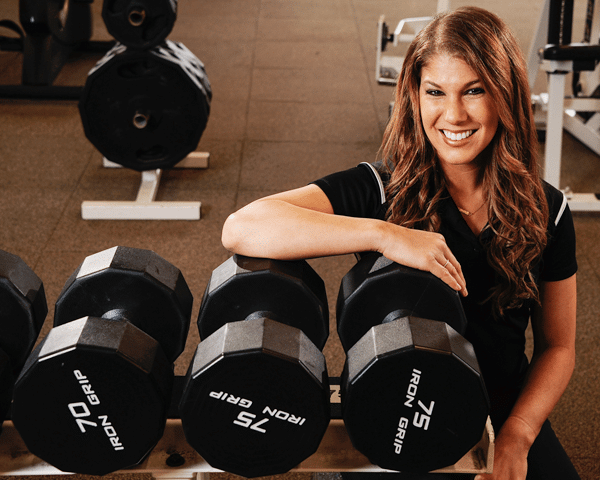Jamie Meeks is changing the culture of health in professional sports, one athlete at a time. As the director of sports nutrition for the New Orleans Saints professional football team, she is on the front line as the industry shifts toward a more personal—and scientific—approach to well-being. “You can’t throw away the book,” says Meeks, a registered dietitian and a board certified specialist in sports dietetics. “But we’re finding evidence to make new recommendations for feeding a football team, and my hope is to continue applying more research-based protocols.”
Meeks is a part of the growing presence of dietitians in the sports world, a trend that she predicts will continue due to the increasing emphasis on more holistic health and wellness regimens. She cites how many of the university-level football teams now have full-time dietitians, some with multiple on staff, to create health plans and monitor new scientific understandings of nutrition and its far-reaching effects. She says the National Football League and Major League Baseball are beginning to adopt that new standard—prior to working with the Saints, Meeks was the first full-time sports dietitian for Louisiana State University Athletics.

“I truly believe we have a major impact on these guys,” says Meeks, the liaison between local food service companies and the team’s ninety football players. “Being here every day you are helping them build healthy habits and recognize that nutrition plays a major role in their performance. Their body is what makes them a professional athlete.”
For the past three years, Meeks has pivoted the NFL team’s health strategy from reactive diet corrections to proactive wellness plans based on research-based evidence. She dedicates a lot of time to evaluating randomized controlled studies dealing with athletes to make recommendations. “I pull apart research articles and apply it to our daily regimen when it’s practical,” she says. “Not all research is done on football players, but even if it’s cyclists, runners, or weightlifters, we shake out the broader health conclusions.”
When she joined the staff as the NFL team’s full-time dietician in 2015, Meeks knew that developing a good relationship with every department was crucial to the Saints’ engagement in the health programs. “The best part that has evolved is gaining the trust of the players, coaches, and all the staff here,” says Meeks, who adds that her outgoing, friendly approach makes it easier to take that first step toward getting to know individual people within each department.
That dynamic is crucial to the development of the educational function, which is a significant aspect of her role, according to Meeks. “Players come to me with all their questions and concerns,” she says. “From dietary changes to new supplements, they find the latest internet fad and will ask for my take on it.” Meeks meets one-on-one with the athletes and might adjust team health plans, and protein-carb ratios, to accommodate an individual’s body composition and position on the team.
Meeks’ approach resonates not just with the team but with her suppliers and partners. “Jamie Meeks is among the growing number of sports dietitians that elite level sports teams around the world are relying on to ensure that athletes are performing at their best,” says Filip B. Keuppens, vice president, global sales & marketing at The Pickle Juice Company. “Her understanding of the functional properties of sports nutrition products, like the muscle cramp-preventing properties of Pickle Juice Sport, is one of the things that sets the New Orleans Saints apart from other sports franchises.”
Being present and available also helps Meeks understand each athlete’s unique health profile so that they can find the optimal solution together. “I’m here before they play and I’m going to be here until they leave,” she says. “I don’t want to shut down their questions, yet at the same time we can’t implement every trend. It’s a balance, but I always sit down with them to talk about it; then we follow what the research says is safe and effective.”
For example, when an athlete approached Meeks to learn more about veganism, she not only reviewed with him the benefits of increasing the amounts of fruits, vegetables, and beans, into his diet, but also educated him on how to strategically incorporate quality protein while on a vegan diet. While Meeks admits that there is no one rule that fits all, she has observed the increased prevalence of a plant-based diet across the sports world—a movement that she predicts will continue to grow in popularity.
Whether the objective is to raise energy levels or build muscle, her comprehensive approach to wellness includes the choices athletes make on and off the field—positive decisions Meeks hopes to continue to influence through cultivating relationships of trust and respect. She maintains that the big picture of health starts with proper portion control and hydration, yet she is creating more and more space for the science of health to lead the team in the best direction.
“We try to reach as many athletes as possible to help them understand and appreciate that nutrition is a major component of the training regimen,” Meeks says. “We want them to take just as much pride in what they put in their bodies as they do when working out in the weight room or doing great work on the field.”


